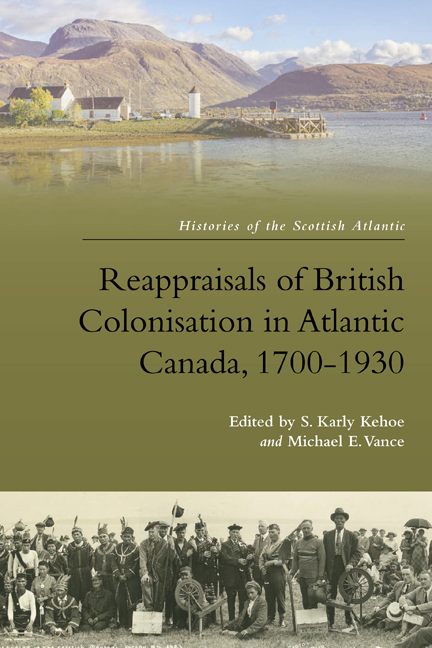2 - British Colonisation in an Atlantic Canadian Context
Published online by Cambridge University Press: 10 October 2020
Summary
Beginning upwards of half a millennium ago, European sojourners and their settler colonialist inheritors sought to acquire resource assets and eventually the land itself in Mi’kma’ki and the neighbouring homelands of the Wolastoqiyik and the Beothuk/Innu. This area, corresponding broadly in settler terms to Atlantic Canada, has seen a process of European expansion premised on appropriating the wealth, the resources and the bodies of non-European peoples. Historically, it was a process of unique antiquity, beginning with fisheries that predated the turn of the sixteenth century, and one in which Scots took an early and influential role. This volume, focusing primarily on eras following the onset of colonial settlement, offers a series of reappraisals of key developments not only in settler societies themselves but also in relation to African and Indigenous inhabitants. Insofar as the geographical frame of reference is Atlantic Canada, there is of course a sense in which the term is anachronistic. Only with the joining of Newfoundland (formally known from 2001 as Newfoundland and Labrador) to Canada in 1949 did Atlantic Canada become a regional designation for what had previously been distinguished respectively as the Dominion of Newfoundland and the Maritime provinces of the Dominion of Canada. Yet for analytical purposes, the term Atlantic Canada represents a justifiable shorthand for a portion of north-eastern North America that – despite variations in environment and in economic trajectories – shared important elements of both Indigenous and settlement histories.
In nineteenth- and twentieth-century historiographies, influenced by the ‘British and settler scholars’ clustered notably in the institutions described by Tamson Pietsch as ‘settler universities’, imperial expansion and colonial settlement were attributed central roles throughout the post-contact era. Yet Indigenous societies in this part of North America, which had evolved over a period of at least some ten thousand years, were not in reality so easily overshadowed. Contact with non-Indigenous commercial voyagers – English, French, Basque and others – from approximately 1500 onwards did make a difference, but not necessarily an unmanageable difference. Prior to that time, continuity and change were underwritten by factors operating within North America and, generally speaking, within north-eastern North America. Environmental change took forms ranging from the gradual but transformative process of warming that followed the last Ice Age to shorter-term variations that influenced transportation patterns and seasonal characteristics.
- Type
- Chapter
- Information
- Publisher: Edinburgh University PressPrint publication year: 2020



